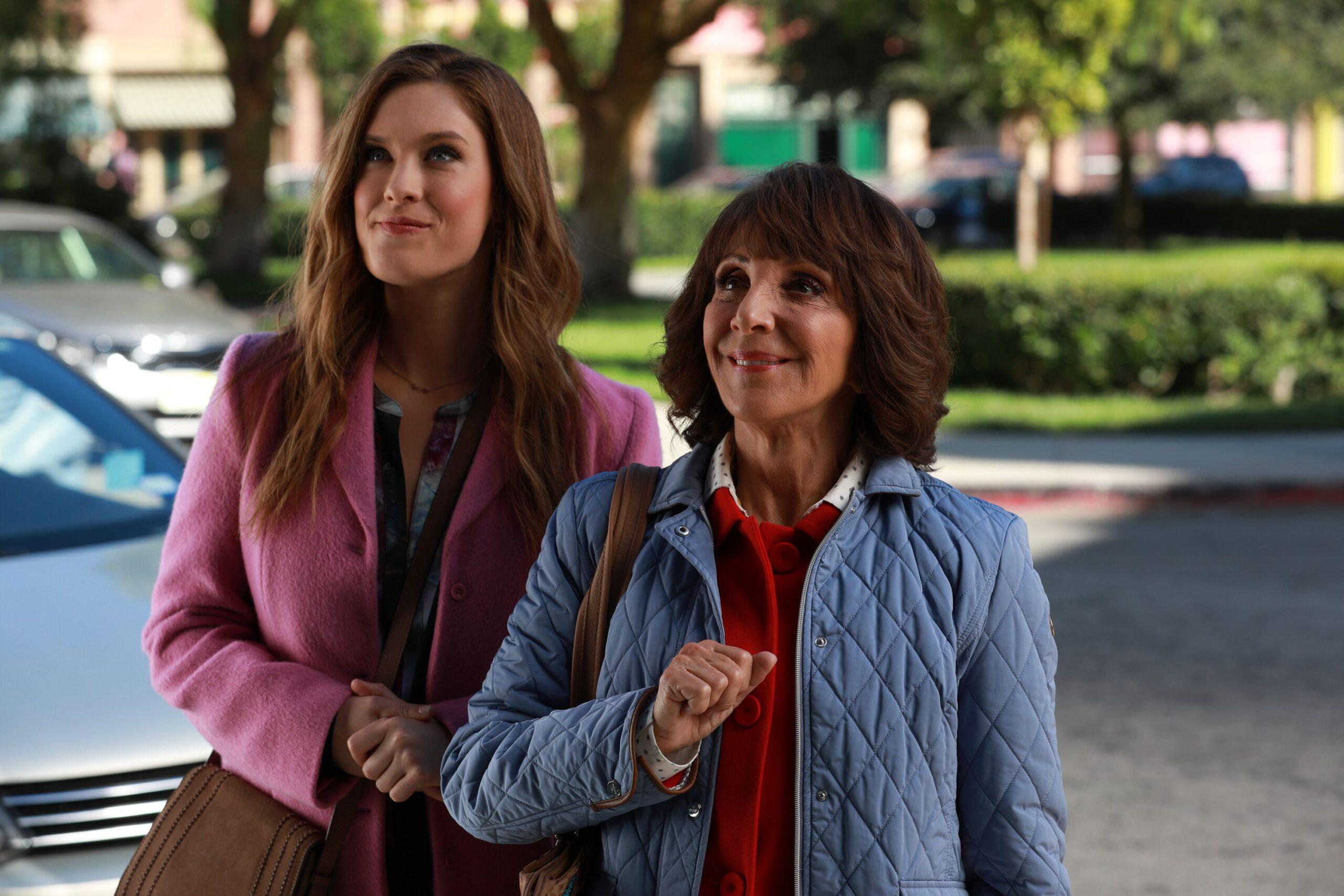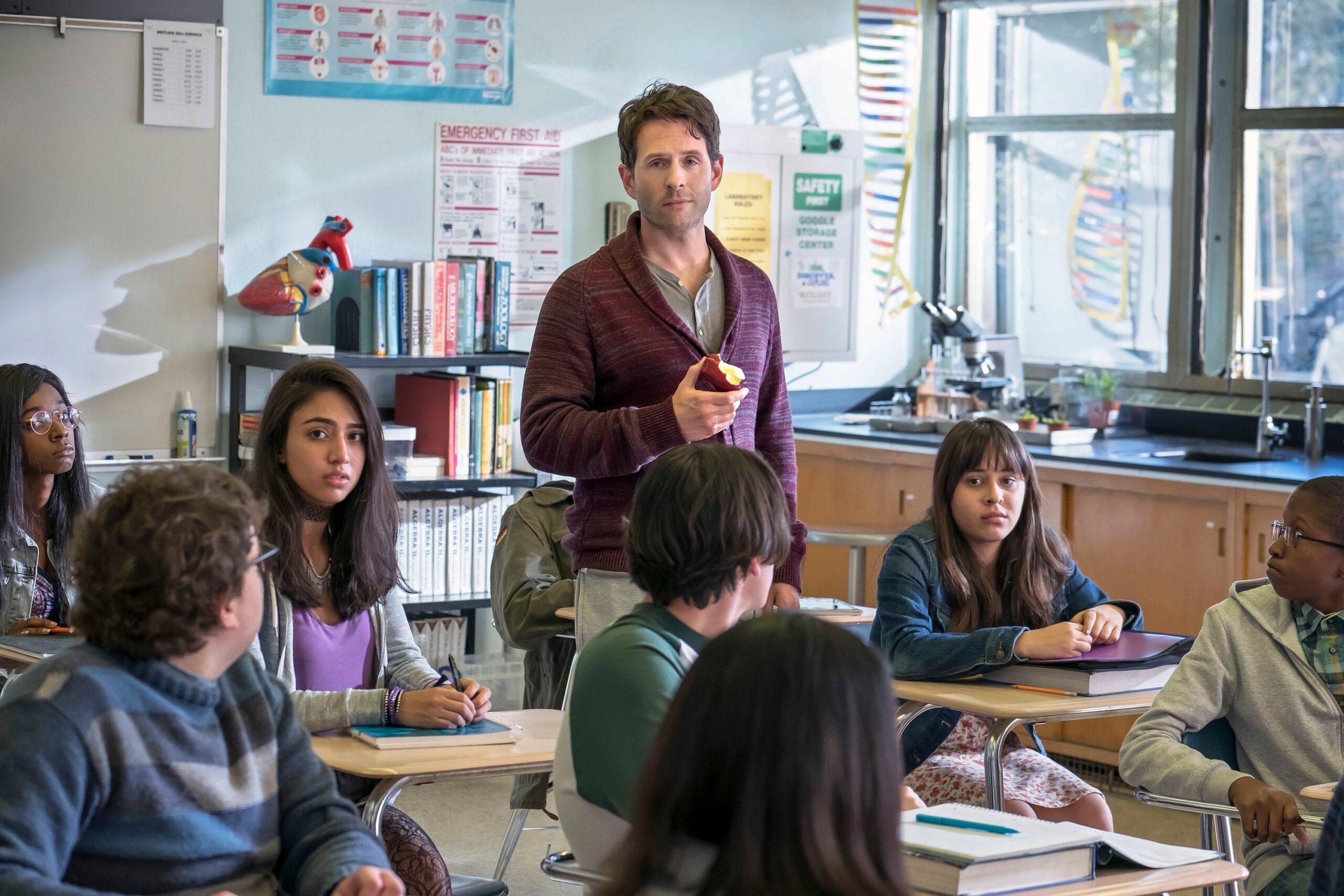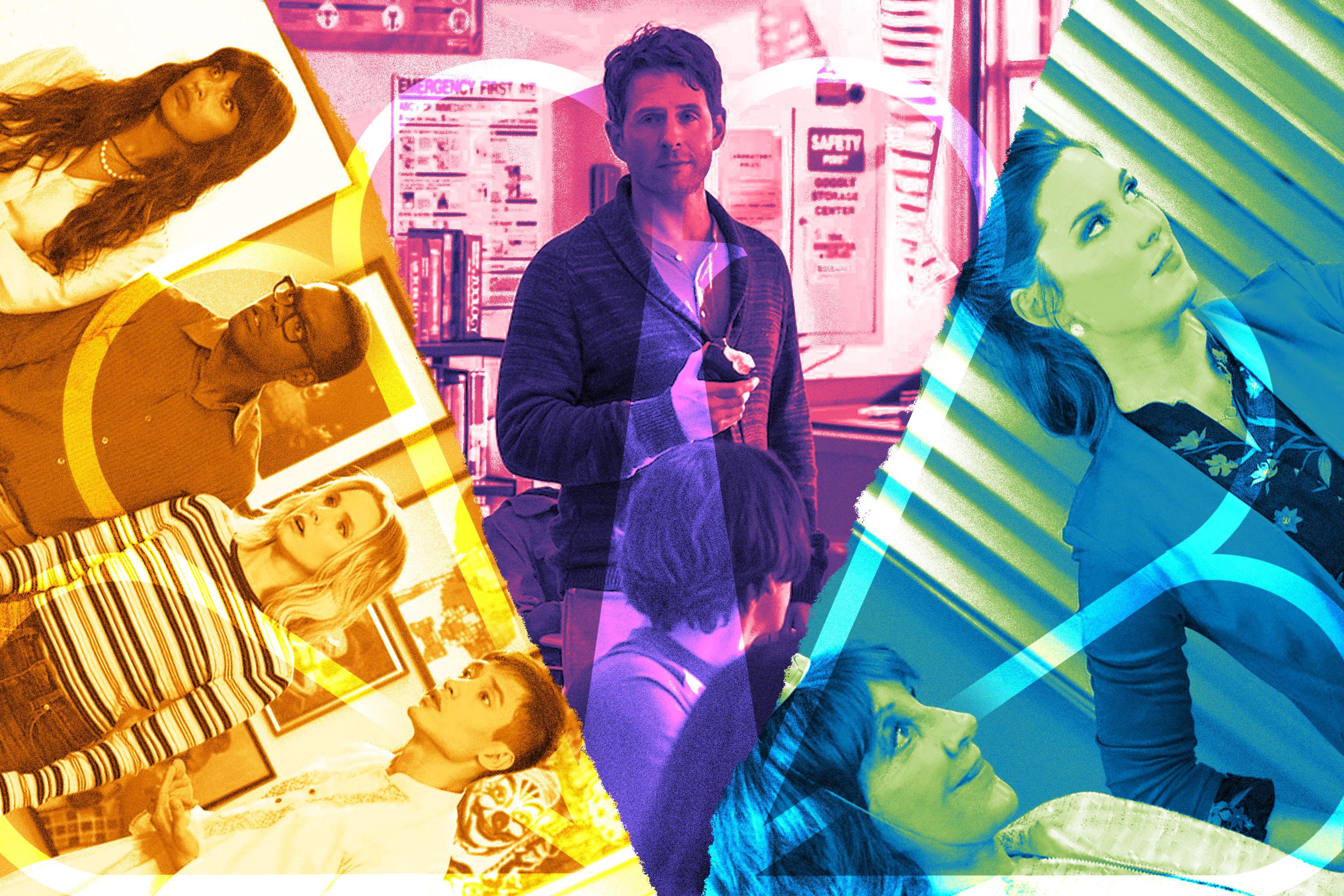NBC’s Must See TV Is Back (Again)
Thursday night is once again the home of television’s best comedy: ‘The Good Place,’ ‘Superstore,’ ‘Will & Grace’—and two newish sitcoms, ‘Great News’ and ‘A.P. Bio’Just more than a year ago, The Good Place shocked audiences to attention with its first season finale. By springing on viewers a twist they hadn’t been trained to expect, the show wasn’t simply upending its own status quo; it was accomplishing something even more difficult to pull off: making Thursday nights on NBC an event again.
The last gasp of the Peacock’s comedy brand had been its midaughts cluster of whip-smart, single-camera half-hours: The Office, Parks and Recreation, Community, and 30 Rock. That crescendo was a direct antecedent of NBC’s current mini-block, centered on Mike Schur’s ethical farce and Justin Spitzer’s blue-collar workplace comedy, Superstore. Schur previously cocreated Parks and Recreation, which operated on a similarly counterintuitive comedy-and-kindness pairing as The Good Place did, while Spitzer once worked as a producer on The Office, whose capitalist drudgery Superstore translated into a more modern form of labor. But “comedy on NBC” will forever conjure the more venerable spirit of Must See TV, the branded Thursday-night lineup that, over 13 years, encompassed such behemoths as Seinfeld, Friends, Will & Grace, and Cheers.
Fourteen months after The Good Place’s first season, the resurgence of Must See TV has become more literal: Thursday nights on NBC are now anchored by the ninth season of Will & Grace, a dispiriting if effective resuscitation that has earned several Golden Globe nominations and a 10th season. Meanwhile, the other side of NBC’s comedy revival — the one that looks forward by cultivating new talents — has continued apace. The network has used the time slot just after Will & Grace to spotlight a couple of promising newcomers from first-time showrunners. Great News, the Tina Fey–produced cable-news spoof created by longtime 30 Rock writer Tracey Wigfield, wrapped up its second season last week; this Thursday, the show’s time slot will be taken over by A.P. Bio, the long-form debut of veteran sketch writer and SNL cast member Mike O’Brien.
The current state of the NBC sitcom is in many ways a contradiction, stuck in the past but doing the vital work of investing in the future. Great News and A.P. Bio are different shows at different phases in their creative lives: The former is a wacky, sincere mother-daughter show that stumbled on an unexpectedly topical angle in its second season, while the latter is a borderline absurd, proudly amoral take on the “bad teacher” setup. Together, they’re an encouraging sign that the state of network comedy, if not necessarily network television as a whole, is stronger than it’s been in years. Or at least since the last Must See TV.
“I pitched the pilot so long ago,” Wigfield tells me from her home in New Jersey. (She’d had a baby just two weeks before, and was kind enough to get on the phone anyway, with just one caveat: “Please bear with me, this is the first time I’ve talked to an adult human.”) The landscape of cable news and its place in American culture has shifted dramatically since early 2016, when NBC ordered the first season of Great News, a sitcom about ambitious-yet-hapless news producer Katie Wendelson (Briga Heelan) and her overprotective mother-slash-(wacky premise incoming)-intern, Carol (Andrea Martin). “Back then, the joke in the pilot was, like, CNN at the time was doing two weeks of reporting on that Malaysian plane they couldn’t find. The joke of it was, you’re working for a job where you have nothing to say.”

The first-season writers’ room for Great News had adjourned before the 2016 election and emerged with a likable show that might have hewed too close to its stylistic cousin 30 Rock, right down to the behind-the-TV-scenes setting and Jeff Richmond score. Reconvening in the era of eight-part shrieking-head panels and fake news, Wigfield says, “It very quickly became clear that cable news was something entirely different.” As difficult as it’s proved for comedy to take on our present political moment, Wigfield realized she had the perfect vehicle to discuss a particular slice of it without reconfiguring the DNA of her show: “How do we make the show feel as topical and feeling like it’s saying something as true about cable news in 2018? It was fertile ground, I found this season, for comedy.”
To kick-start that pivot, Wigfield brought out the biggest gun in her arsenal: Fey herself, who plays the Marissa Mayer–meets–Wendi Deng corporate terminator Diana St. Tropez.
It’s Diana who instigates the rebrand of Great News’ show-within-a-show into a deliberately provocative piece of infotainment, driven by opinionated guests like a “transracial fracking misunderstander” and a gay dog. She’s essential to Great News’ maturation into a surprisingly apt work of media criticism, including such eerily prescient plots as a sexual harassment story line modeled after Bill O’Reilly and Roger Ailes that just happened to air a week after The New York Times’ Harvey Weinstein revelations. (“I would like to say that we were all clairvoyant, but it was really a weird coincidence,” Wigfield says.) The season’s final conflict even centers on an analog for the Gawker-killing tech billionaire Peter Thiel, played by Community’s Jim Rash. Wigfield acknowledges that her inspiration was somewhat esoteric for fans who don’t spend their days thinking about the future of digital media — “Even Andrea Martin was like, ‘Wait, so who is this based on? What was this about?’” — but the combination of storytelling potential and zeitgeist was hard to resist: “It was an opportunity for us to tell this interesting story with this really fun villain, and also try to do some commentary on something that’s so topical.”
Great News’ future remains uncertain; this season’s ratings weren’t stellar, even if poor numbers aren’t the death sentence they used to be. But the show’s creative adjustment still offers an encouraging sign about the network climate for sitcoms that can skillfully splice together staples like the will-they-won’t-they and a more contemporary edge. Great News may have taken a season to get there, but that’s par for the comedic course. “This was the first time I created a show, and so the first season I was like, ‘I think this is going great!’” Wigfield laughs. “You obviously try and do your best and figure things out as quickly as possible, but I do feel like this second season, we’ve had a lot of hitting our stride as to what stories we like telling. It just makes it more fun. And we know what we’re doing a little bit more, the writers and me.”
Where Great News finds inspiration in high-minded journalistic ideals, A.P. Bio hews much closer to the “no hugging, no learning” school of comedic thought (also born on NBC). Its antihero is the disgraced Jack (It’s Always Sunny in Philadelphia’s Glenn Howerton), a Harvard philosophy professor who takes over a Toledo high school class he immediately announces he has no intention to actually teach. A.P. Bio is a workplace comedy without the work.
The way O’Brien describes it, the series began as a thought experiment. The germ that became A.P. Bio was the opening monologue, where Jack lays out the entire show’s premise in 30 seconds flat — not that O’Brien knew the bit was going to become a show. “I wasn’t quite sure whether I would make it into a sketch, a live solo show, or what. Then I was like, ‘Could you sustain that, even for a full episode? How long could he get away with that? Could you do it for a whole 21 minutes without one of the kids telling their parents and it all collapsing?’ Then I did, and I kind of enjoyed it. Then it was like, ‘Let’s see if he can make it 13 episodes.’”

At SNL, O’Brien spent several seasons as a writer and one as a featured cast member before settling into a role as a writer who occasionally appeared in distinctive, offbeat videos like “Grow-a-Guy” and “The Jay Z Story.” Eventually, he felt the impulse to branch out. “Getting up every day and trying to think of three-to-four-minute sketches for something like 11 years, I wanted to get to where people exist for longer than three minutes,” he says. “People always make fun of SNL sketches; they say they state the premise, and that’s it. ‘It’s a cat that drives a car!’ There’s nothing else in the sketch. And that’s all it should be! [But] with half-hour or feature-length films, you get to do so much more with characters.” First, however, O’Brien had to catch up with the TV comedy he’d missed in the SNL grind. “It was overwhelming. It’s hard to say, ‘OK, I’m gonna start watching comedy again! What was this Arrested Development about?’ And then no one wants to talk to you about it, because they’re all done with it.”
O’Brien wrote the A.P. Bio pilot mostly “alone in my office at SNL, when I had a free evening or came in early or something.” Though O’Brien is a graduate of the most dependable talent farm NBC — and the rest of entertainment, for that matter — has, it was never a given that A.P. Bio would join its sitcom lineup. “I had tried, the year before, to sell something to cable. Not this, but another thing,” O’Brien explains. “I got hard noes from places I’d literally never heard of. Like, BubbleGum.com, hard pass. So I didn’t go into the NBC pitch arrogant about it.” The network proved a surprisingly flexible creative partner. “I always like when a notes call feels like a comedy breakdown session,” O’Brien says. “It was a conversation.”
Besides Howerton, the biggest name in the cast is Patton Oswalt, who signed onto the project just 45 minutes before the first table read; much of the heavy lifting is done by the young actors who play the students, some of whom didn’t even go through a full casting process because they didn’t initially have speaking parts. “Tucker Albrizzi, who plays Colin, doesn’t speak in the pilot. He just gets told to sit down,” O’Brien says. “But by midseason, he’s got an episode where he’s speaking half of the lines with Jack. It was a combination of a lot of auditioning and being really lucky, because Tucker had a great look and was funny.” Even as the ensemble finds its rhythm, A.P. Bio already has a spiky strangeness to it, which the curious will be able to sample online before the show resumes a more regular airing schedule post-Olympics. There’s a running gag about Jack’s nemesis dating the singer Lisa Loeb, who makes a couple of cameos; Jack lives in a house outfitted with floral bathrobes and a stair lift, courtesy of his now-deceased mother. Four of the first season’s episodes were shot by O’Brien’s frequent filmmaking partner, Oz Rodriguez, who gives A.P. Bio a muted, unusually sleek look for a broadcast series.
Starting a sitcom from scratch and stabilizing it into a sustainable vehicle are two separate stages in any show’s potential life cycle. But it’s encouraging to see NBC series scattered evenly across the continuum from high-potential newcomer to mid-period machine to living nostalgia object. Great News and A.P. Bio function as both complement and antidote to a show like Will & Grace and the revival phenomenon it personifies. Not everything old is good again, but this particular revival does get something right: Networks still do sharp, structured, 21-minutes-on-the-dot entertainment better than anywhere else.
